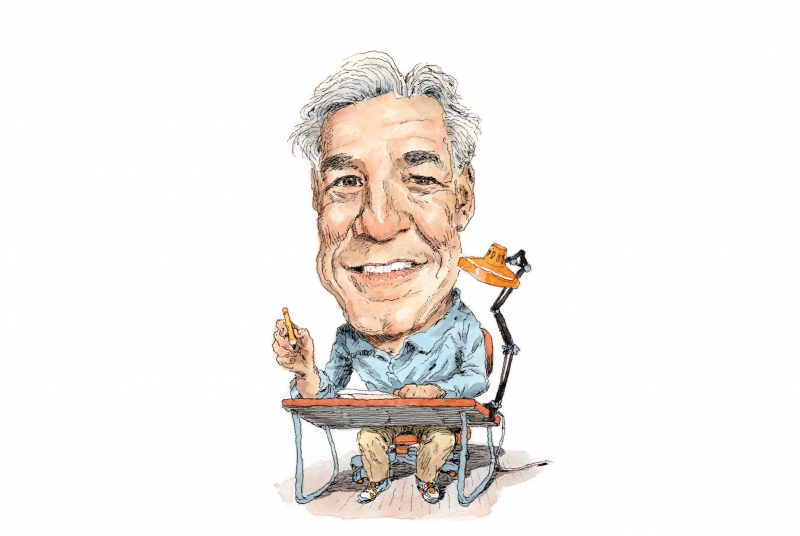
Steve Kelley ’81
Notable: Award-winning, nationally syndicated conservative editorial cartoonist; has performed stand-up comedy; set College pole vault record in 1981
Career: San Diego Union-Tribune, 1981-2002; New Orleans Times-Picayune, 2002-11; Pittsburgh Post-Gazette, 2018-23; his comic strip Dustin, produced with cartoonist Jeff Parker, appears in more than 350 newspapers; daily cartoons appear on gocomics.com
Education: A.B., English
Personal: Lives in Richmond, Virginia; single; father of son Hayden
“It’s hard to change someone’s mind with just a cartoon. But a good cartoon can inspire a lot of interaction among people. If only we had minds that weren’t already made up about everything.”
“I really enjoy making people laugh. Artists want a reaction. If you’re writing a symphony, you want people to feel emotion. If you’re writing a novel, you want them engaged. If you’re a humorist, you want to hear them laugh.”
“I cartooned in high school, greatly influenced by Jeff MacNelly, a Pulitzer-Prize winning cartoonist I admired. I got to Dartmouth keenly aware of political cartooning, which is a weird profession by anyone’s estimation. Sadly, it is being sidelined because people—in the name of tolerance—are becoming greatly intolerant of opinions with which they do not agree.”
“Having pole vaulted in high school and college, I’m back at it at age 64. In an odd way, it helped me realize the gravitational pull that politics has on those who run for office. Clearly, deep down inside, the human psyche longs for the warm embrace of lunacy.”
“Power brokers know much of what goes on in Washington is bad for society, but they do it for their careers. The nature of what is called public service is actually self-service.”
“At the invitation of my classmate Greg Fossedal ’81 I moved from cartooning for The Dartmouth to The Dartmouth Review. After Greg was told The D wouldn’t publish a signed opinion piece he’d written in support of challenge trustee candidate John Steel ’54, Greg decided to start a paper of his own. As a rabble rouser, I thought, ‘Yeah, we’ll show them.’ It was interesting and fun and made us feel important.”
“The Review provided cover for other people who had similar political philosophies. There was a sense on campus that there was a lot more conservative thought there than was being expressed. Dartmouth students weren’t that vocal about politics. The ones who were vocal were people who wanted to change things, and people who want to change things are typically on the left of the political spectrum. They certainly were at the time. That has all turned around now, which is fascinating.”
“I’m a voracious consumer of news and information. I like for my cartoons to have as much impact as they can. The first step is to identify the subject that, in my opinion, ‘everyone is talking about.’ Today, you have to shy away from many topics, because you might commit a microaggression, which is hilarious. Everyone walks on eggshells, constantly afraid.”
“No one promises you freedom from offense in this country. Social repercussions are sufficient to guide people in how to behave and what to talk about and what not to talk about and when. That’s way better than legislation.”
“My experience as a Montgomery fellow in 2008 was unexpected. At the concluding public forum on campus, I got on stage and figured, ‘I’m going to get them rolling in the aisles.’ But it just didn’t happen because of what people now talk about as ‘wokeness.’ Elite colleges are where it emerged, and I got a taste of it. I showed a bunch of cartoons that are theoretically hilarious, but they were much less hilarious there.”
“If you’re going to limit writers only to things that offend no one, you’re going to entertain no one.”
“I can’t remember a cartoon that I have done that I would retract today.”










